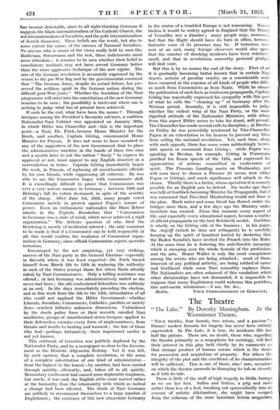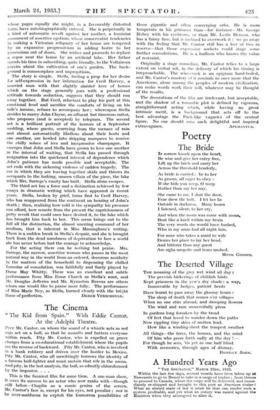The Theatre
"The Lake." By Dorothy Massingharm At the Westminster Theatre.
"Faun trestles, four boards, two actors, and a passion " : Dumas' modest formula for tragedy has never been entirely superseded. In The Lake, it is true, its incidence fills but half the picture. There are, no doubt, those who, regarding the theatre primarily as a megaphone for sociology, will find their interest in this play held chiefly by its comments on that strange product of human nature which is the desire for possession and acquisition of property. For others the integrity of the plot and the excellence of its characterization will be sufficient. This is one of those, alas rare, occasions on which the theatre succeeds in thumping its tub as cleverly as it tells its tale.
There is little of the stuff of high tragedy in Stella Surrege as we see her first. Sullen and listless, a prig and more rather than less of a fool, breaking out spasmodically into an eczema of artistic dilettantism, she might have escaped from the columns of the more luxuriant fiction magazines, whose pages equally she might, in a favourably distorted form, have autobiographically entered. She is perpetually in a kind of automatic revolt against her mother, a feminine monument of assertive egotism, whose eonservatist tendencies in making a Victorian reliquary of her house are tempered by an expansive progressivism in adding lustre to her possessions out of doors. She wishes and proceeds to replace a copse near the house by an artificial lake. Her father spends his time in subscribing, quite literally, to the Voltairean maxim about the cultivation of one's garden. The back- ground is commonplace and unpropitious.
The story is simple. Stella, finding a prop for her desire for self-expression in her infatuation for Cecil Harvey, a
married man with that slightly sinister love of horses which on the stage generally goes with a professional attitude towards seduction, suggests that they should run away together. But Cecil, reluctant to play his part at this emotional level and sacrifice the comforts of living on his wife's income, refuses to accompany her ; whereupon Stella decides to marry John Clayne, an affluent but timorous suitor, who proposes (and is accepted) by telegram. The second act is a brilliant portrait of the horrors of a September wedding, where guests, scurrying from the menace of rain and almost automatically libellous about their hosts and one another, are herded into dripping marquees to receive the chilly solace of ices and inexpressive champagne. It emerges that John and Stella have grown to love one another in the interval of waiting, that Stella has passed through resignation into the quickened interest of dependence which John's patience has made possible and acceptable. The act ends with the sickening violence of sudden tragedy. The ear in which they are leaving together skids and throws its occupants to the lurking, unseen villain of the piece, the lake which Mrs. Surrege's vanity has built. Stella alone escapes.
The third act has a force and a distinction achieved by few essays in dramatic writing which have appeared in recent years. Stella, broken by grief, turns first to Cecil Harvey, who has reappeared from the continent on hearing of John's death ; then, realizing how cold is the sympathy his presence can afford, how remote from the present the capriciousness of petty revolt that could once have desired it, to the lake which has brought him back to her. This scene brings out to the full all the distinction, the almost unerring command of her medium, that is inherent in Miss Massingham's writing. There is a sudden break in Stella's despair, and she is brought back from the dead numbness of deprivation to face a world she has never before had the courage to acknowledge.
For the acting there can be nothing but praise. Mrs. Surrege, the narrow, assertive woman who passes in the most natural way in the world from an ordered, decorous assiduity in the matters of the household to dispensing the chilled formulae of consolation, was faithfully and finely played by Dame May Whiny. There was an excellent and subtle performance from Miss Esme Church as Stella's aunt, and Mr. Douglas Jefferies and Mr. Kynaston Reeves are others whom one would like to praise more fully. The performance of Miss Marie Ney, as Stella, burned clearly with the bright







































 Previous page
Previous page